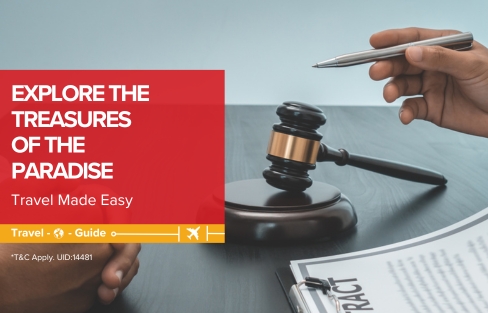

Law & Ethics in the UK
- Introduction
- Local laws and rules
- Local culture
- Local ethics
- Laws to Abide by
- What to do if you run into legal trouble in the UK?
- Finding help in the UK
- Things to avoid in the UK
- Conclusion
- FAQs
Introduction
With our Awareness Guide for your next visit, learn about the United Kingdom's rich history, vibrant culture, and breathtaking scenery. Explore historic castles, savour regional cuisines, and find hidden jewels in bustling cities like London and Edinburgh. This guide will make sure you get the most out of your trip to the UK, from well-known attractions like Big Ben and Buckingham Palace to the spectacular splendour of the Scottish Highlands. Prepare yourself for an incredible voyage!
Local laws and rules in the UK
Did you know?
- Salmon handling in suspicious circumstances is illegal in the UK according to the Salmon Act of 1986. This peculiar rule was created to stop the unlawful poaching of salmon, but because of its ambiguous language, it has, over time, given rise to funny interpretations.
- To guarantee a smooth and pleasurable vacation, it's crucial to be informed of local laws and regulations when visiting the UK.
- In general, it is not permitted to consume alcohol in public settings, and many public locations have smoke-free policies.
- Keep in mind that all passengers must wear seat belts and that traffic travels on the left.
- Alcohol purchase for people under the legal drinking age of 18 is prohibited.
Travel tip: Respect UK laws by having a valid ID on you and abiding by the no smoking and no drinking guidelines. To ensure a seamless and comfortable vacation, become familiar with the regional traditions.
- Be mindful of noise levels because too much noise can cause problems and complaints.
- Respect designated smoke-free zones and properly dispose of cigarette butts.
- Avoid leaving trash behind, and keep public areas tidy.
- Always wait in queue politely, especially when taking public transit.
Learn these rules so you can behave respectfully and enjoy your time in the UK.
Local culture in the UK
Did you know?
The London subterranean, sometimes known as the "Tube," is the oldest subterranean transportation network in the world. It was first used in 1863 and is today a well-known component of the London transit system.
The UK has a rich and diverse cultural tapestry that reflects both its past and its present. The use of polite expressions like "please" and "thank you" is encouraged. It is socially acceptable to stand in a queue to show patience and order. Tea is highly valued in the UK, where it is frequently consumed in social contexts.
Travel tip: Witness the infatuation with gardening in Britain. Discover beautiful ones like London's Kew Gardens or Edinburgh's renowned Royal Botanic Garden.
Locals congregate at pubs for alcoholic beverages, meals, and discussion as a fundamental part of social life. With top-notch museums, theatres, and galleries displaying a variety of artistic expressions, the arts are of utmost importance.
Travel tip: It's possible for some companies to be closed on bank holidays in the UK. Participate in neighbourhood celebrations at these times.
Humour in Britain is known for its wit, sarcasm, and dryness. Football (soccer) games are especially loved because they promote a sense of community. Conversation starters include subjects like the weather and current affairs. Accept these cultural quirks to truly experience the alluring culture of the UK.
Local ethics in the UK
Did you know?
- The UK is renowned for having a high sense of decorum and civility. In order to show respect for other people, it is usual to wait until all passengers have left public transit before boarding.
- The idea of "Litter Heroes" promotes thoughtful waste disposal. The UK places a strong focus on environmental ethics, which is shown in the number of communities that use volunteers to maintain public spaces clean.
Here are undoubtedly a few crucial ideas on regional ethics in the UK:
- Show consideration for lines. Cutting in front of others in line is considered rude; queuing is the norm.
- Being on time for meetings, appointments, or social events is appreciated.
- Using the words "please" and "thank you" frequently is encouraged, and being courteous to others is valued.
- Respecting personal space and refraining from listening in on other people's talks are normative.
Do note: Some areas on trains and other forms of public transit are labelled "Quiet Zones." To respect others' desire for a tranquil travel, keep talking at a moderate volume and refrain from making phone calls.
- Accepting diversity and demonstrating tolerance for various cultures, faiths, and lifestyles.
- To lessen your carbon footprint, recycle as much as you can, pick up after yourself, and take the bus or train.
- In restaurants and for other services, gratuities are usual and often range from 10% to 15% of the total bill.
- Social drinking is acceptable, although indulging in large amounts of it in public may be looked down upon.
Travel tip: Be sensitive to different backgrounds and cultures. To promote healthy encounters, stay away from difficult subjects and have open and courteous dialogues.
- Respect no-smoking areas by abiding by specified smoking areas and smoking bans.
- When discussing touchy subjects, be thoughtful and open-minded to avoid offending anyone.
Laws to Abide by in the UK
Did you know?
- Using a mobile phone while driving is prohibited in England and Wales, regardless of whether you are moving slowly or stopped at a red light. To use your phone, you must be securely parked and the motor must be off.
- Even if you're in the backseat, the law in the UK mandates that you buckle up whenever you're in a moving car. Both the driver and the passengers may face fines and penalties for failing to comply.
The following laws must be followed whilst in the UK:
- Use seat belts, drive on the left side of the road, and obey posted speed limits.
- The drinking age limit is 18. Alcohol consumption is often not permitted in public places.
- Smoking is not permitted in enclosed public areas or in some outdoor spaces.
- Illegal substance usage and possession are strictly forbidden.
- Steer clear of unruly behaviour, excessive noise, and commotion.
Do note: Wild camping (camping outside of permitted campsites) is typically prohibited in the UK without the landowner's consent. If you want to camp in more distant locations, stay in established campgrounds or get the necessary permission.
- Comply with the law against robbery, vandalism, assault, and any other illegal activity.
- Age limitations apply to the purchase of tobacco and e-cigarette goods.
- Armaments, The use and possession of firearms are subject to strict regulations.
- Adhere to rules regarding animal care, such as keeping dogs on leashes in public places.
Do note: Although the majority of tourist destinations permit photography, some establishments, like museums or galleries, could have limitations. To prevent legal problems, abide by established regulations and refrain from snapping images in off-limits locations.
- Observe cybercrime laws, respect copyright laws, and adhere to privacy rules.
- Comply with rules regarding pollution prevention and waste disposal.
Why you should respect the local laws in the UK as a traveller?
Did you know?
Unless you are in a serious situation, it is illegal to use your car's horn in a built-up area in the UK between the hours of 11:30 PM and 7:00 AM. It's done to prevent nocturnal noise annoyance that isn't necessary.
For a safe and legal trip, it is essential to obey local rules in the UK. Respecting these regulations promotes peaceful interactions with people and exhibits cultural awareness. By protecting your safety and the safety of others, it keeps you out of legal problems. You may contribute to the community's well-being and maintain a clean and orderly environment by sticking to rules like driving on the right side of the road, refraining from inciting public commotion and abiding by drinking and smoking restrictions. Respecting local laws also shows that you value the culture and morals of the nation you are visiting, which improves your travel experience overall and makes a good impression on both residents and other tourists.
What to do if you run into legal trouble in the UK?
Did you know?
- Regarding the use of TV licences, the UK has severe rules. Regardless of the device you use or whether you view public service or commercial channels, you are legally required to acquire a TV licence if you watch live TV, record it or use the BBC iPlayer.
If you run into difficulty with the law in the UK:
- Stay Calm: Remain composed and assist law enforcement.
- Seek Legal Help: Speak with a local lawyer or solicitor for guidance and assistance.
- Contact Embassy/Consulate: Request aid and support from the embassy or consulate of your nation.
Do note: Avoid discussing the matter in public or on social media if you find yourself in legal difficulties. By doing this, your legal standing is maintained and unanticipated legal issues are avoided.
- Recognise Your Rights: Recognise your legal privileges and responsibilities under UK law.
- Attend Court: If necessary, participate in court proceedings and abide by the rules of the law.
- Keep Records: List interactions, names, and other information for later use.
- Notify Family/Friends: Let them know where you are and the circumstance.
- Follow Local Laws: Throughout the procedure, follow local laws and customs.
- Cooperate: Obey court orders, comply with legal requirements, and supply all required information.
It's vital to consult experts, approach the problem patiently, and show respect for local procedures because legal systems might be complicated.
Where to find help in the UK as a tourist?
Travel tip: If you get lost, ask a policeman or other staff member for instructions in public areas like train stations. They're typically happy to give you directions and help you find your way about.
You can get assistance from a number of sources as a visitor to the UK:
- Centres for Tourist Information provide travel-related information, maps, and guides.
- In the event of a police, fire, or medical emergency, dial 999.
- For non-emergencies, go to police stations or regional administration offices.
- The embassy or consulate of your nation offers assistance, particularly in crisis or legal situations.
- Staff at hotels can direct you and put you in touch with local services.
- Tour companies can help with planning and information about trip.
- You can ask station or vehicle workers questions about transport.
- Useful information can be found on the websites of government agencies and travel organisations.
- Tourists can get instructions and advice from many people.
Keep yourself informed, always have your phone handy, and don't be afraid to ask for help when you need it.
Things to avoid when in UK/ Tips
Did you know?
In the UK, it's normal to use the right side of escalators, allowing individuals who are rushing to walk up or down to use the left side. This keeps the foot traffic moving smoothly.
Take into account these suggestions to improve your visit to the UK:
- Queue Respectfully: British people appreciate neat lines, so patiently wait your turn.
- Mind the Road: As traffic travels on the left, look right before crossing streets.
- Tipping Etiquette: If the service charge isn't included, leave a tip in restaurants of between 10% and 15%.
- Public transport: For hassle-free travel on buses, trains and other forms of public transport, use Oyster cards or contactless payments.
- Weather: Dress in layers because the weather can change suddenly. Also, it is useful to carry an umbrella.
- British slang: Local Expressions For easier communication, become familiar with typical British idioms.
- Emergency services: For immediate assistance with police, fire, or medical emergencies, dial 999.
- Cultural Sensitivity: Respect various cultures and traditions and steer clear of touchy subjects.
- Cash and Credit Cards: Since some locations might not accept cards, always carry both cash and cards.
- Remain Hydrated: Remain hydrated, particularly when sightseeing or going for a lengthy walk.
- Public Behaviour: Steer clear of boisterous discussion and excessive displays of affection in public.
By adhering to these recommendations, you'll blend in with society, make the most of your trip, and guarantee an unforgettable time in the UK.
Conclusion
In conclusion, your trip across the UK is expected to be a rich synthesis of tradition, modernity, and culture. Adopting these rules will help you to thoroughly immerse yourself in the UK's diverse tapestry, from the appeal of historic landmarks to the friendliness of its people. Always keep in mind that your memories are shaped by every interaction and decision you make, so approach each situation with openness and cultural awareness. When booking your UK flight ticket, it is better to opt for travel insurance for UK to cover any unforeseen emergencies like lost wallets or medical expenses. In today’s age, getting travel insurance online is quicker than ever, which is why having international travel insurance is not just easy, but crucial.
FAQs
1. How should I respond if I encounter legal issues in the UK?
Maintain your composure, get legal counsel from a nearby attorney, and ask your embassy or consulate for assistance.
2. What role do pubs have in British culture?
The heart of social life is the pub. They provide a sense of camaraderie, a place to unwind, and a place to enjoy a drink.
3. What role does queuing have in British culture?
The social convention of queuing reflects orderliness and patience. In a variety of circumstances, from using public transport to shopping, it's crucial to wait your turn.
4. Is it legal to consume alcohol in public spaces in the UK?
Drinking in public is mostly not permitted, with the exception of places like bars and outdoor dining areas.








 Health Insurance
Health Insurance  Travel Insurance
Travel Insurance  Car Insurance
Car Insurance  Cyber Insurance
Cyber Insurance  Critical Illness Insurance
Critical Illness Insurance
 Pet Insurance
Pet Insurance
 Bike/Two Wheeler Insurance
Bike/Two Wheeler Insurance  Home Insurance
Home Insurance  Third Party Vehicle Ins.
Third Party Vehicle Ins.  Tractor Insurance
Tractor Insurance  Goods Carrying Vehicle Ins.
Goods Carrying Vehicle Ins.  Passenger Carrying Vehicle Ins.
Passenger Carrying Vehicle Ins.  Compulsory Personal Accident Insurance
Compulsory Personal Accident Insurance  Travel Insurance
Travel Insurance  Rural
Rural 










